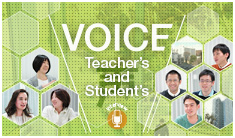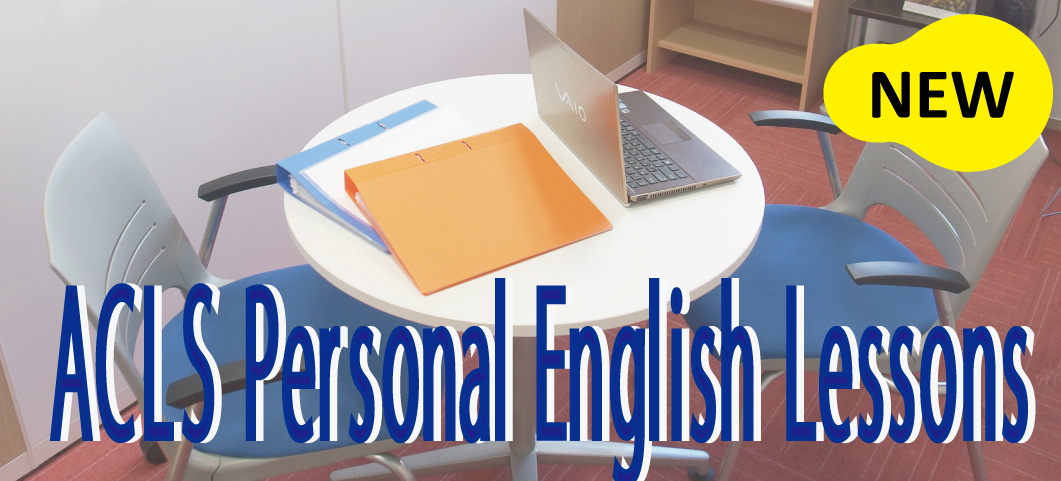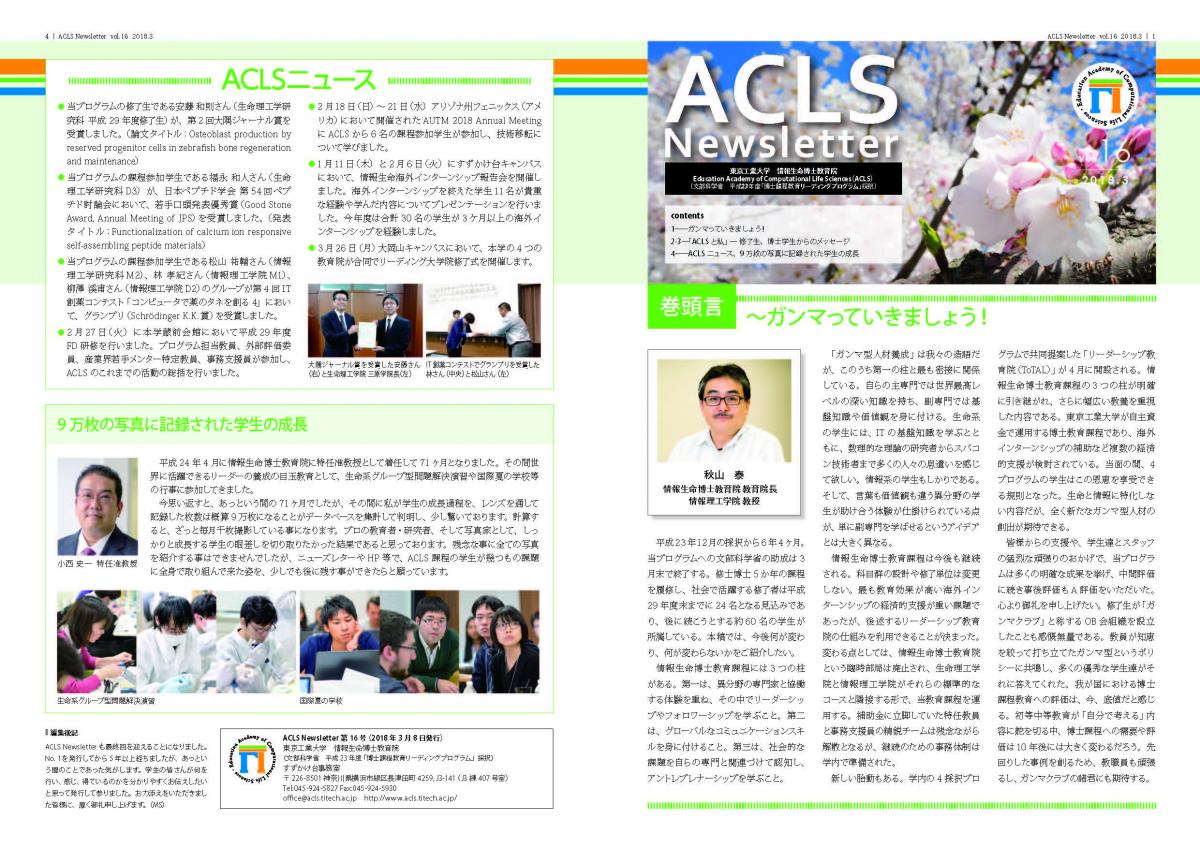- Home
- Teacher's and Student's voice
- Hideki Tohda / Kazuki Ohno
Hideki Tohda / Kazuki Ohno


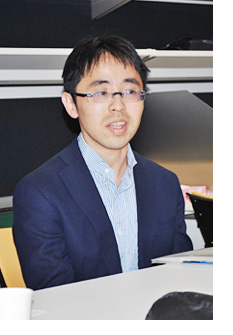 Ohno: In my previous post as a senior researcher at Astellas Pharma Inc., I participated in collaborative research to produce medicine to treat what are called Neglected Tropical Diseases—diseases with many patients in developing countries. There are seven organizations participating in this collaborative research project, including the Tokyo Institute of Technology. Dr. Yutaka Akiyama and Dr. Masakazu Sekijima participate from ACLS. That project became the connection that led to me being invited to ACLS.
Ohno: In my previous post as a senior researcher at Astellas Pharma Inc., I participated in collaborative research to produce medicine to treat what are called Neglected Tropical Diseases—diseases with many patients in developing countries. There are seven organizations participating in this collaborative research project, including the Tokyo Institute of Technology. Dr. Yutaka Akiyama and Dr. Masakazu Sekijima participate from ACLS. That project became the connection that led to me being invited to ACLS.
Products and services making use of IT are getting a lot of attention in the health and medical field that I am involved in ("Healthcare IT," "Mobile Health"), and it is expected to be one of the industries with substantial growth. I believe that the "Γ-type" professionals advocated by ACLS are those expected to actively lead this new field. I wanted to have a part in training valuable professionals for the industry, so I joined as an Associate Professor in the Industry Youth Mentor Program.
Tohda: When the Industry Youth Mentor Program was being instituted, Dr. Nobuhiro Hayashi asked me for my opinion: "This kind of program has been developed. What do you think?" That was how I first heard about ACLS. I had known Dr. Mitsuo Sekine, the ACLS Program Supervisor, since I was a student. The direct reason is that I received an invitation from both Dr. Hayashi and Dr. Sekine.
My field of expertise is molecular biology. Genomic analysis had already started by the time I was a student, so it was becoming accepted that some knowledge of information science was necessary, even in the world of life science. For this reason, I studied information science independently, to some extent. Even after I joined a company (Asahi Glass Co., Ltd.), I had thought that "we need people who have a knowledge of both life and information sciences" in my own lab. When I received the invitation, I really felt the need and importance of educating people in both disciplines, and chose to participate in ACLS.

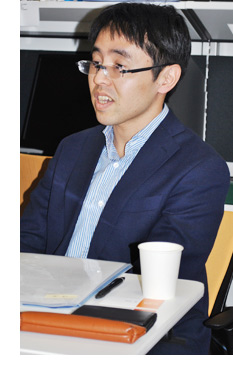 Ohno: Certainly, I would think that studying both fields at the same time is very hard work. Life science, it can be said, is an academic discipline which values exceptional phenomena. For example, when a new species is found, it is one "discovery," a subject to be researched. On the other hand, we can say that information science is about "integration," an academic discipline that takes various exceptional phenomena and explains them using simple logic. The ways of thinking are completely different. For this reason, I personally think it is very difficult to overcome the differences of the two disciplines and merge them together.
Ohno: Certainly, I would think that studying both fields at the same time is very hard work. Life science, it can be said, is an academic discipline which values exceptional phenomena. For example, when a new species is found, it is one "discovery," a subject to be researched. On the other hand, we can say that information science is about "integration," an academic discipline that takes various exceptional phenomena and explains them using simple logic. The ways of thinking are completely different. For this reason, I personally think it is very difficult to overcome the differences of the two disciplines and merge them together.
However, professionals who are able to transcend those things are required in society today. The ability to overcome these differences, even when working outside of his own field—that is important now.
Tohda: I agree. It's simple to say "fields of knowledge," but I think there are actually two types. The first type is like infrastructure—"things everyone must know," such as Japanese, mathematics, English, and how to use computers. Except those mention above, I think exists the second type which includes academic disciplines such as life science and computer science.
What society requires now is an "on-site capability"—a knowledge of the latter, an academic field, and the ability to create synergy with a different discipline. For example, when an information science professional comes into the realm of life science, the people already there (at the "site") must also understand something about information science to produce effective results. People who understand the way of thinking in another discipline outside of their own and are completely familiar with it, and can overcome the differences are the kind of people needed. Those kinds of "Γ-type" professionals are already in great demand today. The other day, I had a chance to speak with people from many organizations at a workshop, and every company was criticizing: "There is no one who can do that. What are we going to do?" I strongly feel that this need is only going to increase in the future.

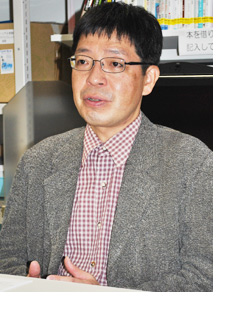 Tohda: There are many attractive features. If I was a student, I definitely would be in this program!
Tohda: There are many attractive features. If I was a student, I definitely would be in this program!
What appeals to me the most is that I would be able to interact with people from another discipline. Both life science and information science, in a way, are set apart from the world in general. There are cutting-edge research projects in both fields, and they keep advancing further and further before the rest of the world knows about them. They both have their own terminology, and are not easily understood. They are viewed in certain aspects as "Information science—otaku; life science—magic." Having close communication with people of other disciplines in ACLS is good training for explaining things clearly to people who are working on things outside of their own discipline.
Another appeal of ACLS is that there are many opportunities to determine what industry and today’s society are looking for. These things are difficult to explore from inside a university, but they can be acquired by interaction with people working in industry, such as through the Industry Youth Mentor Program. It should be very meaningful in considering one's own future.
Ohno: I find great appeal in the concept of the community called ACLS. The professors, the staff members, and the students all share the common purpose: "let's do something interesting in an interdisciplinary environment." Yet, each person has a different field of research and way of thinking. That is the appeal.
Like Dr. Tohda, I also find great appeal in the Industry Youth Mentor Program. The career path that I had planned in my years as a student is different than my actual path. I think that being able to envision and to show the many possibilities in pursuing a career is very meaningful to both myself and the students.
Also, another unusual appeal is the enthusiasm of the administration and support staff. Not only the professors, but also the administrative staff of ACLS display their passion that "we must develop professionals useful to society," and I feel this is a great motivation for the students. The students feel the enthusiasm of the staff, and they also probably realize that "I must be participating in something great."

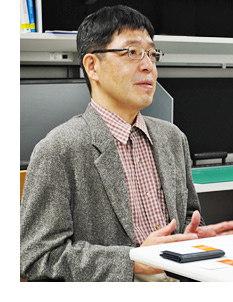 Tohda: I hold lectures several times a year, on "Industrial Sociology" and laboratory seminars. Also, I speak with students in the laboratory each week in regards to their progress and offer advice to them. I also use email and keep contact with them at least every other day. Honestly, it is difficult to eke out time and other resources. My company graciously agreed to my participating in ACLS, but I am not concentrating on ACLS alone. I am working likewise on projects at the company. There are physical limitations such as time and place, so it can be very challenging to successfully carry both duties forward.
Tohda: I hold lectures several times a year, on "Industrial Sociology" and laboratory seminars. Also, I speak with students in the laboratory each week in regards to their progress and offer advice to them. I also use email and keep contact with them at least every other day. Honestly, it is difficult to eke out time and other resources. My company graciously agreed to my participating in ACLS, but I am not concentrating on ACLS alone. I am working likewise on projects at the company. There are physical limitations such as time and place, so it can be very challenging to successfully carry both duties forward.
However, ACLS proved to have value exceeding the trouble. I believe it is beneficial, not only for myself, but for my company and the industry as well. We can foster students who have an awareness of business, and, at the same time, foster industrial professionals who have a student's point of view. It has been invaluable to be a part of ACLS, to have the opportunity to step into the education field and be involved in this work.
Ohno: In addition to lectures and supporting students, I participate in events such as "An Evening with a Mentor." It is hard work, but I agree with Dr. Tohda that the value is worth much more. Foremost is being able to interact with gifted students, which I find stimulating. Also, I've been able to network with fellow mentors and exchange information about work. That also has been of great value.
ACLS also inspired me to review my own career. In talking to students about my career, I feel that I was able to organize my own thoughts, which has led to the founding of my own company.

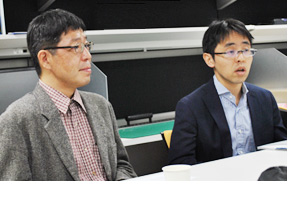 Ohno: Rather than counting the direct advantages or pros and cons, I strongly feel that ACLS has a large value for society, and I find great pleasure and enjoyment in that. As I mentioned earlier, ACLS has a vibrant atmosphere of "let's do something interesting in an interdisciplinary environment." I think the feeling of participating in something that will contribute to society is what makes ACLS appealing and valuable. It has also become a wonderful community comprised of people who share similar values. I hope people who feel the same way we do will join us.
Ohno: Rather than counting the direct advantages or pros and cons, I strongly feel that ACLS has a large value for society, and I find great pleasure and enjoyment in that. As I mentioned earlier, ACLS has a vibrant atmosphere of "let's do something interesting in an interdisciplinary environment." I think the feeling of participating in something that will contribute to society is what makes ACLS appealing and valuable. It has also become a wonderful community comprised of people who share similar values. I hope people who feel the same way we do will join us.
Tohda: There is a good infrastructure in place, so I don't see any bad reasons not to join! Instead of looking at advantages and disadvantages, try participating in whatever seems intuitively interesting. It will lead to expanding your own possibilities. ACLS is highly flexible, and can adapt to suggestions from participants. My hope is for people to follow what they feel instinctively interesting and fun, and proactively broaden the limits of the directions they can go.
Ohno: I think that coming to understand the thinking of and interacting with people from another discipline is a very valuable experience. I feel that gaining such experience at ACLS will prove to be a great asset.
* The contents of this article are accurate as of the date of the interview in November 2014.






